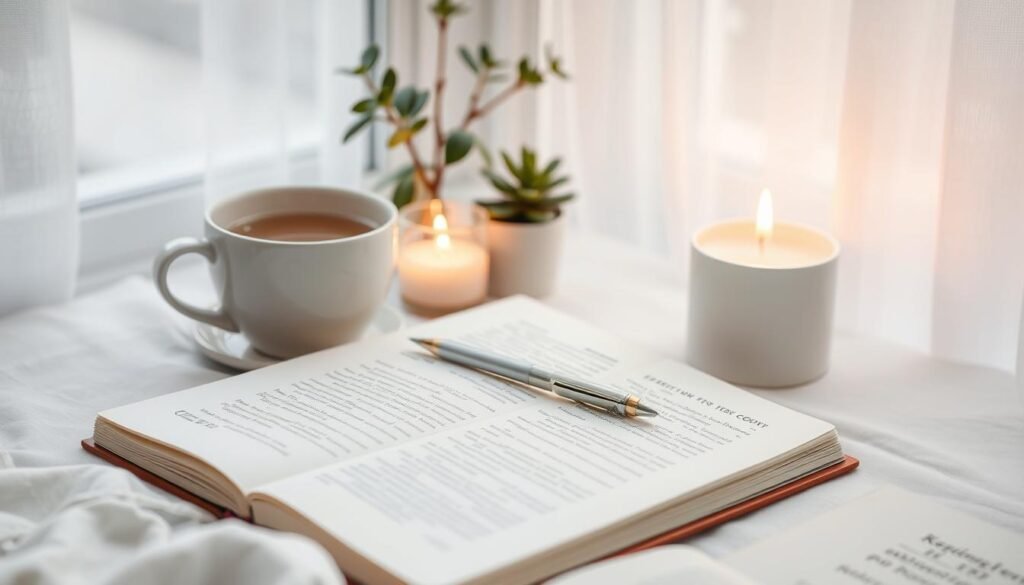About 40 million adults in the US struggle with anxiety disorders. This shows a big need for effective ways to calm the nervous system. Because stress is more common now, many people choose natural stress relief methods. These not only help with anxiety but also improve emotional health.
This article talks about different natural approaches. We look at herbal remedies, mindfulness, physical activities, and changing what you eat. All these can help calm your nervous system. By adding these natural methods to your day, you can get better at managing anxiety. You’ll also feel a stronger sense of holistic wellness.
Key Takeaways
- Over 40 million adults face anxiety disorders in the US.
- Natural remedies can effectively promote a calming effect on the nervous system.
- Physical activity plays a vital role in reducing stress and anxiety.
- Mindfulness and meditation are powerful tools for emotional regulation.
- A well-balanced diet supports mental health and can alleviate anxiety symptoms.
Understanding the Nervous System and Stress
The Nervous System is key in how the body responds to different situations, especially stress. It involves the autonomic nervous system, which has two parts: the parasympathetic and the sympathetic divisions. These manage functions we don’t think about. When we’re stressed by things like giving a talk, missing calls, or running late, the sympathetic part makes our body ready to tackle the challenge or escape.
The parasympathetic system helps us relax after stressful moments. This is often called the “rest and digest” phase. It calms the body down with the help of the vagus nerve, which connects the brain and the body. Keeping this system in good shape is important for preventing serious health issues like heart disease and migraines.
Long-term stress can harm the brain, leading to mood swings and memory problems. Being constantly stressed is linked with many health problems. These include stomach issues, obesity, and high blood pressure. This shows how our minds and bodies are closely linked, and why managing stress well is vital.
To improve the calming function of our body, engaging in simple activities helps. This includes gentle exercise, meditating, and deep breathing. Just 5 to 10 minutes of these practices can make a big difference in stress levels. Knowing how stress and the nervous system are connected can lead to healthier life choices for lasting calmness. For more tips on managing stress and its impact, visit this guide.
| Effects of Chronic Stress | Manifestations |
|---|---|
| Cognitive Decline | Brain fog, memory loss, difficulty in decision-making |
| Emotional Distress | Anxiety, depression, irritability |
| Physical Symptoms | Headaches, muscle tension, fatigue |
| Health Risks | Heart disease, high blood pressure, migraines |
The Calming Effect on the Nervous System Through Herbal Remedies
Herbal remedies give a whole-person approach to ease anxiety and calm the nervous system. They can help reduce stress and let people take charge of their mental health. Many herbs are known for helping with Natural Stress Relief and anxiety disorders.
Chamomile: Nature’s Tranquilizer
Chamomile is a soft but strong herb for easing anxiety. A 2016 study showed that taking 1,500 mg of chamomile daily for 12 weeks made relapses less likely in people with Generalized Anxiety Disorder. Its calming effects make it a popular choice for those looking to reduce stress.
Lavender: A Multi-Purpose Solution
Lavender is famous for its relaxing effects. A 2017 review found that Lavender essential oil can calm the brain’s chemical receptors. This makes it a good short-term treatment for anxiety. Using lavender in aromatherapy, or as a supplement, can help lower anxiety.
Lemon Balm: An Ancient Comfort
Lemon balm eases anxiety symptoms. Small studies show it can reduce worry and excitability. However, some may experience mild side effects like nausea or stomach pain.
Passion Flower: Overcoming Generalized Anxiety Disorder
Passion flower may help with anxiety symptoms. Early trials show reduced anxiety in participants. It has calming effects that help with stress and anxiety disorders.
Valerian: Restoring Peaceful Sleep
Valerian root has been used for a long time to help relax and sleep. Studies suggest it can lower anxiety and improve sleep. Some people might experience mild side effects such as headaches or dizziness. It’s important to buy Valerian from trusted sources due to varying quality in supplements.
Those looking into herbal remedies for anxiety relief can find more information here.
Natural Stress Relief Through Physical Activity
Being active is key to fighting stress. Regular workouts greatly improve your mood and lessen anxiety. When we exercise, our brains release endorphins, making us feel better. Health experts suggest adults should do moderate aerobic exercises for 150 minutes weekly. Or they could opt for vigorous activities for 75 minutes a week.
Benefits of Exercise on Mental Health
Exercise is a strong stress fighter with many mental health benefits. Research shows working out can:
- Boost self-confidence and overall mood.
- Help you relax and fight off light depression and anxiety.
- Improve focus and thinking skills.
Even quick activities, like 10-minute walks, are beneficial. This shows that flexible and accessible exercises can support Mindfulness Practices.
Stretching: Easing Tension in the Body
Stretching is crucial for relaxing muscles. It works well with aerobic exercises to increase flexibility. People who stretch regularly feel less physical stress and think more clearly.
Walking in Nature for Mindfulness
Walking in nature isn’t just good exercise; it also promotes Mindfulness Practices. It helps you unwind and escape daily stress by enjoying the outdoors. Studies find that nature walks reduce stress hormones and improve mental peace. By walking regularly in nature, we can change our stress experience and value being outdoors.
Relaxation Techniques to Soothe the Mind
Using relaxation techniques daily can really help with natural stress relief. They make dealing with daily stress easier. Benefits include lower blood pressure, better sleep, and better digestion.

There are many ways to soothe the mind, such as:
- Progressive muscle relaxation
- Visualization techniques
- Deep breathing exercises
- Aromatherapy
- Yoga and tai chi
- Massage therapy
- Art and music therapy
These relaxation techniques bring many good changes. Practices like autogenic relaxation and mindfulness meditation lower anxiety and decrease breathing rates. Visualization techniques, for example guided imagery, offer a mental getaway.
| Technique | Benefits |
|---|---|
| Progressive Muscle Relaxation | Reduces tension throughout the body |
| Deep Breathing | Lowers heart rate and calms the mind |
| Yoga | Enhances flexibility and improves sleep quality |
| Visualization | Creates mental imagery for relaxation |
| Aromatherapy | Uses scents for enhancing mood and lowering stress |
Using positive ways to handle stress helps too. Things like laughing, working out often, and eating healthy matter. Good time management and solving problems also make a big difference.
Adding these natural stress relief methods into your routine can change your mental health for the better. Many techniques are easy to find, like free audio downloads or apps. They’re flexible, so you can find what works for you.
Mindfulness Practices and Meditation for Calm
Mindfulness and meditation are key for a calm mind. They help us focus on now and control our awareness. So, we feel less anxious and stressed. Different meditation methods also help improve our mood and how we handle feelings.
Types of Meditation for Reducing Anxiety
There are many meditation types for different preferences. Popular kinds are:
- Mindfulness meditation: It’s all about being aware of the current moment, helping reduce stress.
- Loving-kindness meditation: This method creates feelings of love and kindness towards ourselves and others. It helps balance our emotions.
- Guided meditation: You listen to someone guiding you, which helps you relax and feel calm.
- Body scan meditation: This technique makes you aware of body sensations to relax fully and feel emotionally steady.
Reviewing over 200 studies shows mindfulness tools like MBSR and MBCT really cut down stress, anxiety, and sadness. Regularly practicing builds resilience, better coping skills, and steadiness in tough times. Meditation is an easy, cost-saving activity for everyone. It needs no special gear and offers big benefits.
Exploring Prayer as a Form of Relaxation
Prayer is a spiritual way to meditate, bringing peace and a connected feeling. It helps keep emotions stable by giving a sense of belonging. Studies show that praying and other spiritual practices make our minds healthier and lessen anxiety. Mindfulness embraces these spiritual aspects, helping achieve inner peace.
These practices boost mental and emotional well-being by balancing our nervous system. They foster calm and effectively lower anxiety. For those keen on learning more about mindfulness and its effects on our nerves, this resource is very insightful.
Breathing Exercises for Immediate Stress Relief
Breathing exercises are a swift and powerful way to ease stress right away. These stress relief techniques help calm the body’s stress reactions. A study found that 54 out of 72 breathing methods helped reduce stress and anxiety effectively.
Incorporating certain breathing exercises into your day helps manage stress. Practices like diaphragmatic breathing and box breathing are key for natural stress management. Make sure these exercises last at least five minutes for the best effect. Let’s look at some effective techniques:
- Deep Breathing: Aim to make your exhales longer than your inhales. Try inhaling for four seconds and exhaling for six to help you relax.
- Abdominal Breathing: This type of breathing reduces the body’s effort.
- Equal Breathing: Breathe in and out for the same time to feel more at peace.
- Resonant Breathing: Slow and gentle breaths can ease anxious feelings.
- Lion’s Breath: Six strong exhales can help you feel calmer.
- Alternate Nostril Breathing: Switching breath between nostrils can bring tranquility.
Regular practice of breathing exercises can really help lower anxiety. Just a few minutes of focused breathing each day can make a big difference. To go deeper, try using guided meditation techniques for an extra boost in fighting stress.

Nutrition and a Well-Balanced Diet to Support Calmness
Nutrition is key to feeling calm and managing anxiety. Eating a balanced diet helps the brain chemicals that control mood. Adding nutrient-rich foods gives you important vitamins and minerals. This can support your mental well-being. Choosing the right foods is a big step towards handling anxiety better.
Foods that Enhance Neurotransmitter Function
Certain foods are great for keeping your brain chemicals balanced and lowering anxiety. For instance:
- Omega-3 fatty acids in fish like tuna, salmon, and halibut can reduce anxiety.
- Complex carbohydrates in whole grains help increase serotonin, which reduces stress.
- Eggs are good for serotonin production because they have tryptophan and vitamin D.
- Pumpkin seeds are full of potassium and zinc. They can help lower stress and anxiety.
Eating fatty fish twice a week is very beneficial. Studies show that a diet rich in these nutrients is crucial for calming nutrition and managing anxiety.
The Importance of Hydration in Anxiety Management
Staying hydrated is vital for mental health. Even a little dehydration can make anxiety worse. Drinking enough water helps keep cortisol, a stress hormone, in check. This prevents unhealthy cravings.
For good hydration:
- Make sure to drink water all day.
- Eat fruits and veggies. They add to your water intake.
- Cut back on too much caffeine and sugary drinks that may spike your anxiety.
Drinking plain water and calming herbal teas can help you relax. These diet tips are essential for a balanced diet. They help manage anxiety and improve calmness.
Journaling: A Therapeutic Approach to Anxiety Management
Journaling is a key tool for managing anxiety. It offers a safe place for self-expression and thinking deeply. Through therapeutic writing, individuals can express their emotions and thoughts. This often leads to better emotional understanding and self-awareness. Studies show that keeping a journal helps with anxiety and stress.
Writing down thoughts regularly helps identify what causes stress or anxiety. This understanding lets people tackle these issues directly. Setting aside a few minutes each day for journaling boosts mental health. Experts often suggest writing for five to 15 minutes. Freewriting, which may last up to 20 minutes, also aids in emotional release and creativity.
Using a thought diary helps too. It has columns like Case, Feeling, Thinking, Illusions, and Reality. This structure helps sort through complex thoughts. It pushes individuals to reflect and notice wrong patterns of thinking. Plus, it offers a way to track and explore fears over time.
A study in 2018 found that journaling focused on emotions reduces anxiety and depression in just a month. It also improves mental health, mood, and can even help the body function better. This includes better lung and liver function.
Pairing journaling with a healthy lifestyle boosts its benefits. This includes relaxation techniques, balanced eating, regular physical activity, and enough sleep. Writing regularly leads to important self-discoveries and strengthens emotional well-being.
Using prompts in journaling can also break through writer’s block. It encourages deeper thought. Creating a plan to manage stress through journaling prepares people for tough times. It helps challenge and change negative thoughts into positive ones.

| Benefits of Journaling | Description |
|---|---|
| Identify Triggers | Aids in recognizing causes of anxiety and stress. |
| Improve Mood | Facilitates emotional expression, enhancing psychological well-being. |
| Document Progress | Tracks symptoms and behaviors over time to promote awareness. |
| Enhance Resilience | Encourages proactive problem-solving and supports emotional growth. |
| Challenge Distorted Thoughts | Provides a framework for addressing and reframing negative thinking. |
In the end, journaling is more than a way to manage anxiety. It also enriches mental health. It brings clarity, support, and healing paths for emotional well-being.
Integrating Holistic Wellness into Your Daily Routine
Embracing holistic wellness focuses on the mind, body, emotions, and spirit as one. It leads to natural stress relief when made part of everyday life. For physical health, it’s key to eat well, stay active, and sleep enough. These aspects strengthen not only your body but also your mind and heart.
Mindfulness meditation can improve calmness and spotlight mental and emotional health. Stress management, with deep breathing and relaxation, fights stress’s bad impacts. Stress can cause many physical problems, so managing it is vital.
Creating a balanced daily routine could involve activities such as:
- Engaging in at least 30 minutes of moderate-intensity exercise most days.
- Maintaining a consistent sleep schedule for improved rest quality.
- Eating a balanced diet rich in fruits, vegetables, whole grains, and lean proteins.
- Practicing mindfulness, meditation, or yoga to enhance mental clarity and reduce stress.
- Strengthening social connections to support emotional well-being.
By caring for physical, mental, emotional, and spiritual health, you can achieve balance. A holistic approach leads to better health management and less need for treatments. The aim is to reach your best by harmonizing all health aspects.
| Aspect of Wellness | Benefits | Daily Practices |
|---|---|---|
| Physical | Reduces disease risk, enhances mood | Regular exercise, balanced diet |
| Mental | Improves focus, reduces anxiety | Mindfulness meditation, relaxation techniques |
| Emotional | Enhances resilience, supports health | Social connections, journaling |
| Spiritual | Encourages purpose and connection | Reflection, community involvement |
| Occupational | Promotes balance and satisfaction | Time management, work-life balance |
Conclusion
Finding peace in our nervous system is key for our well-being. Many natural methods—like herbal solutions, staying active, practicing mindfulness, eating well, and finding ways to relax—help improve our mental health. By adding these strategies into our everyday life, we can reduce stress and anxiety. This supports a balanced lifestyle.
With more people living in cities, learning to manage stress is becoming essential. Using nature, like looking at natural settings or doing outdoor activities, helps make our surroundings peaceful. Studies back up how nature helps us, showing the positive effects on our body.
Trying out these natural methods can help us find peace in our busy lives. This holistic approach benefits both our minds and bodies. It also gives us strength to deal with the challenges of today’s world. We become better equipped to tackle life with calmness and resilience.